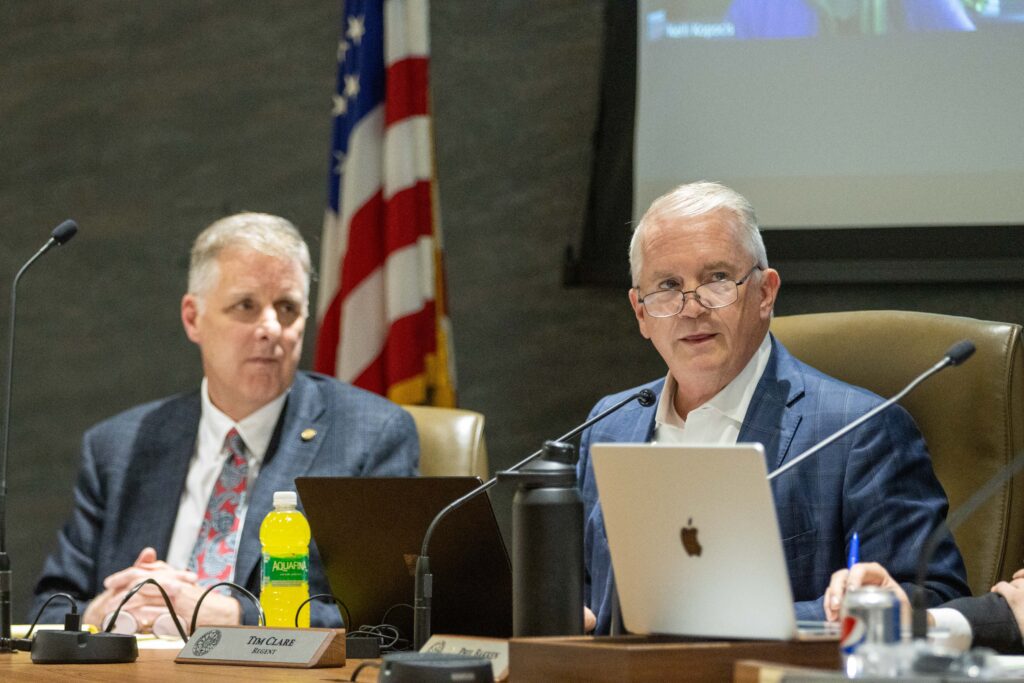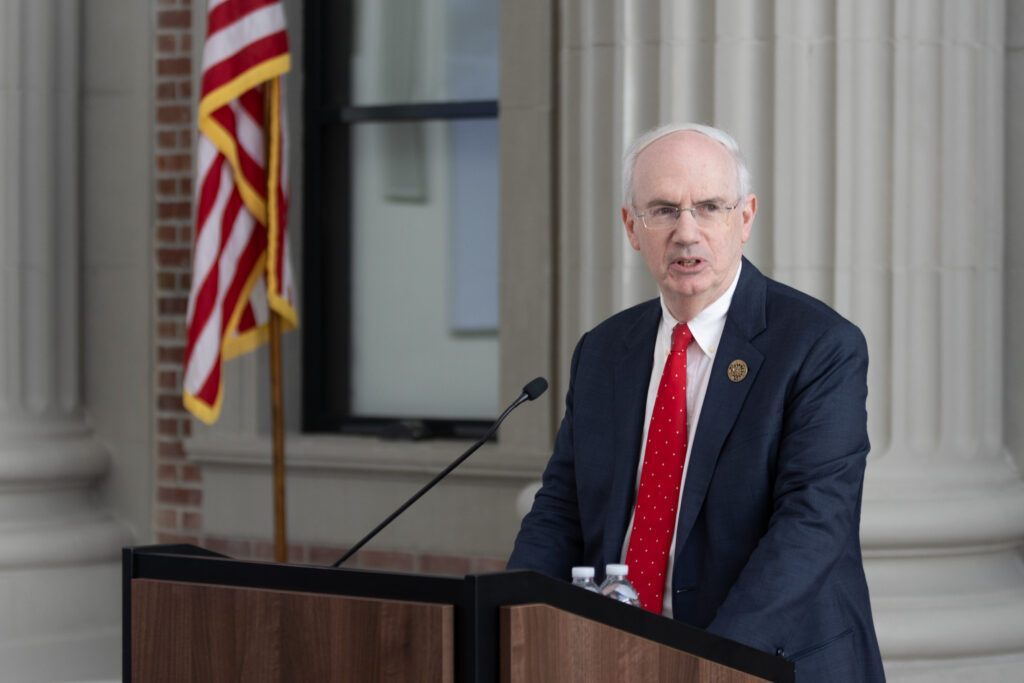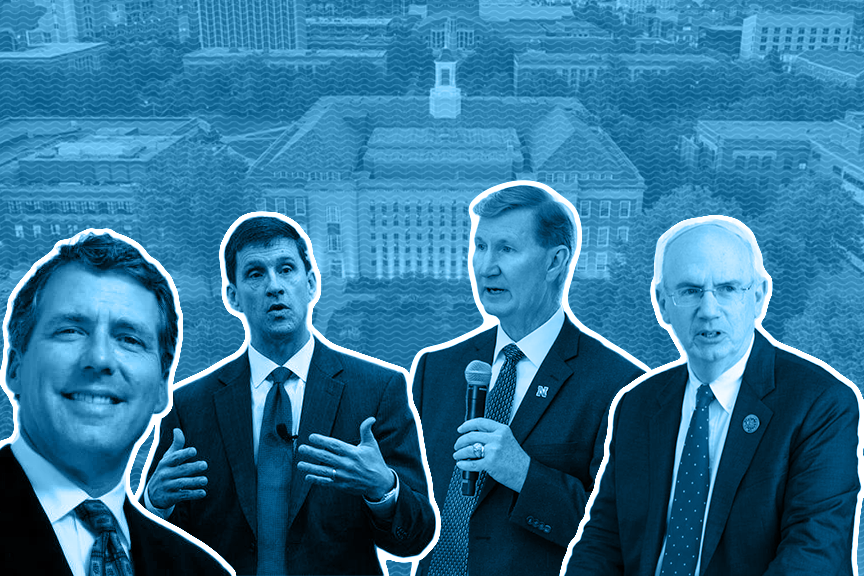When Jeffrey Gold begins his presidential tenure on July 1, he hopes to distinguish himself in one key area: the duration of his term.
“I think one of the biggest challenges in education, particularly in public higher education, is leadership turnover,” Gold said.
Gold, who was officially hired for the job in April, said he aims to serve as the University of Nebraska president for 10 years. This would make him an outlier among recent NU presidents and others across the country, including in the Big Ten Conference.
Since 2000, Big Ten university presidents have stayed in the job roughly 5.5 years on average, a Flatwater Free Press analysis found. Two of those institutions – the University of Wisconsin and Ohio State University – have each had three presidents in the last five years. Come July, NU will join that group.
Increasing political pressure, ever-tightening budgets and cascading crises all contribute to this turnover, said current and former university presidents and presidential search committees in interviews with the Flatwater Free Press. It’s also become an increasingly demanding job, they say – a reality that has coincided with soaring salaries for University of Nebraska presidents and college leaders across the U.S.
At NU, the lack of longevity among recent presidents has rankled some officials, most notably, Gov. Jim Pillen, a former NU regent. It’s also proved costly – the University of Nebraska has spent millions on escalating salaries and also paid in lost momentum.
“Higher ed is a tough, tall order, and presidents get burned out,” said NU Regent Timothy Clare, who chaired the presidential search that selected Gold. “We’re no different from any other school.”

The last couple of years have been especially difficult for higher education, said James Milliken, NU president from 2004 to 2014 and current chancellor of the University of Texas system.
“In large part because of what appears to be declining public confidence in and support for colleges and universities across the country,” Milliken said. (Correction: This story originally misstated the year Milliken left the university. He departed NU in 2014.)
Only 36% of Americans have “a great deal” or “quite a lot” of confidence in higher education, which is down by about 20 percentage points from eight years ago, according to a recent Gallup poll.
Declining confidence has coincided with shorter presidential tenures.
When Clare joined the Nebraska Board of Regents in 2008, public university presidents were in their position an average of 8 years, according to an American Council on Education survey. By 2022, it dropped to 5.9 years.
For Gold’s immediate predecessors at NU, Ted Carter and Hank Bounds, it was even less. Both men left after four years on the job. They didn’t respond to interview requests.
“Early on, I was thinking, ‘Gosh, why can’t we keep somebody?'” Clare said. “I understand now why that is.”
In a letter announcing his resignation in 2019, Bounds noted “this job has also been personally demanding.”
“Presidents are commenting that this isn’t a 40-hour workweek job. It’s 24/7, 365 days of the year,” said Judith Wilde, a professor at George Mason University who specializes in the study of presidential search firms and contracts.
The NU president is responsible for coordinating university policies, managing budgets, and ensuring compliance with federal laws across the system – a role that spans the entire state, and includes constituents and programs in all 93 Nebraska counties. It also requires working with state lawmakers who have varying views of the university system, Clare said.
On any given day, a president is maintaining relationships with alums, donors, students, taxpayers, board members and legislators, said Kevin Reilly, former president of the University of Wisconsin from 2004 to 2013.
“Unless you’ve sat on your hands for five or six years, you’re going to have made decisions that can really piss people off,” Reilly said.
It’s a tough job that’s gotten tougher, Reilly said, a reality reflected in rising salaries.
Since 2000, the University of Nebraska presidential annual salary has increased by 164% (adjusted for inflation), rising from $200,503 to over $1 million in 2024, according to documents provided by the university.
Gold is poised to surpass some of the highest paid public officials in Nebraska after benefits and bonuses are added. His annual salary of $1.06 million is the highest base salary in the state compared to other public salaries analyzed by the Flatwater Free Press. The university’s football coach, basketball coach and the athletic director in Lincoln are paid even higher.
In 2023, the University of Illinois system president’s base salary was $881,509, according to the Illinois Board of Higher Education. Carter’s base salary at Ohio State is $1.1 million, according to university documents. System presidents are often paid more than leaders of single campus universities.
“It’s just again, so hard and so taxing that we recognize it’s a difficult position to be in,” Clare said.
Salaries are not the only cost.
Since 2003, the University of Nebraska has spent more than $600,000 on its four presidential searches, according to Nebraska Board of Regents documents.
After Carter announced his resignation to become president of the Ohio State University system, NU paid Academic Search $225,000 – plus reimbursable expenses – to find a successor.
That too reflects a national trend in higher education.
The use of executive search firms has grown from 2% in 1975 to nearly 92% in 2015, according to research by Wilde, the George Mason University professor.
Michigan State University, which has had six different people serve in the president’s role since 2018 amid a parade of scandals, reportedly paid an executive search firm $270,000 to help find its current president in 2023.
“A search firm comes riding in like a knight in their shining armor on a white horse and says ‘look at everything we can do for you,’” Wilde said, adding that many search firms promise confidentiality, competitive candidates and due diligence.
NU’s contract with Academic Search tasked the firm with organizing listening sessions, building a leadership profile, advertising the search and leading background checks.
“If you tried to do it on your own, without the search firm, I think you’d really struggle,” Clare said.
Experts say university systems, which tend to favor hiring presidents with academic leadership experience, are fishing from a shrinking pond.
That’s helped contribute to increasingly secretive searches. Search committee members at MSU and NU had to sign non-disclosure agreements, according to committee members at both schools.
“One of the issues now is that these jobs have gotten so tough, that the pipeline of people interested has shrunken,” said Reilly, now a senior consultant and fellow with the Association of Governing Boards of Universities and Colleges.
After Ohio State hired Carter in August, Pillen told radio station KLIN that he was “very disappointed.” The governor, who served on the NU Board of Regents for 10 years, also expressed frustration with the general trend in higher education of presidents leaving after four years for “a greener pasture.”
“I love Ted Carter, think the world of him, but he gave us … his word. We changed things, we improved things, so him bailing at this moment is very disappointing.”
Those frustrations resurfaced in March after Husker Athletic Director Trev Alberts left his alma mater to take the same job at Texas A&M University. Alberts told the Omaha World-Herald his decision came down to leadership. At the time, NU had not identified a permanent president to fill the job vacated by Carter.
Pillen issued a press release criticizing NU regents and calling on them to “act urgently and decisively” in naming a new president.
About a week later Gold was named the priority candidate. Gold said the comments did not impact his hiring experience.

There are always political and ideological factors, Gold said. “But that is true in every state, and you know, just about every institution that I’m aware of across the country right now,” Gold said.
Clare said turnover can disrupt progress. A new president tends to want to mold their own strategic plan for the university system. Then it takes time to get everybody to buy into that plan.
“That’s why we were so conscious about trying to bring that 10-year piece to the forefront and recognize that that’s a priority for us.”
Gold said his ultimate goal is to ensure that every Nebraskan is proud of their public university system.
“I know that I have a lot to learn in the next months and years ahead,” Gold said. “I also know that I’m starting with a knowledge base that somebody from the outside would not have.”
A president staying on the job for a decade would be unusual in the current climate, but not entirely unheard of. NU can look to a Big Ten rival for an example.
University of Illinois President Timothy Killeen began his tenure in 2015. No other Big Ten university presidents’ tenure stretches back to earlier than 2019. Killeen led through three years of budget impasses in the Illinois statehouse, the COVID-19 pandemic, and seven different Board of Trustee chairs.
Today, enrollment is up and the budget is steady, Killeen said.
“It’s not, for me, about being ranked in some list. It’s about optimizing impact for the public good,” he said. “And if you focus on that, then it’s about excellence, scale, integrity, presence, grounding in the public good.”



5 Comments
Maybe it’s time to start thinking outside of the box, instead of trying to lure what is thought to be the best into Nebraska, maybe look at the great educators we have right here in the state of Nebraska from our current public education high schools as well as local colleges. Looking internally could result in bringing forward great candidates who would take half the pay saving money because they already have roots in the state and would not want to look outside.
As far as the 24/7 aspect of the job, that is no different then a school superintendent or current college VP, etc. what should be stressed is for incoming executive leaders building their internal team to delegate some of that authority and commitment to develop a team not just an individual.
Any truth to the rumors that the delay was caused by Pillen himself, rejecting candidates because they didn’t fit his extreme right-wing philosophy? And then when the delay became public because of the Trev Alberts situation, Pillen changed his tune and blamed the regents for the delays. The governor loves to be a champion of things that he is responsible for breaking. Like being a champion of keeping young talent in the state while simultaneously creating and supporting extreme policies that drive them away.
There are at least two reasons for university president turnover. The first reason is self-generating: every next job includes an enormous pay raise so not moving would be foolish. The second reason is that – except for the two dozen, or so, most exclusive schools – universities are becoming ungovernable. The pool of potential college students is flat or shrinking every year. As a result, there is an ever-growing political pressure to enroll more-and-more students who are, on average, less-and-less academically able than applicants admitted in the past. Second, there will soon be an ever-growing political pressure to force faculty to do whatever is necessary to graduate every enrolled student, especially including those who are incapable of performing college-level academic work. The baccalaureate degree will soon join the high school diploma as a document of ever-declining value. That will leave only two reasons to become a university president: (1) higher pay and (2) escape from remaining on the faculty.
The real story that needs to be told is the dismal academic performance of NU in the Big 10. In 2011, the University of Nebraska-Lincoln made history and headlines for being the first institution kicked out of the Association of American Universities by a member vote. Established in 1900, the AAU had counted Nebraska as a member since 1909. In 2012 Nebraska joined the Big 10. Currently, Nebraska ranks 12/14 in Engineering Schools according to US News & World Report (Purdue #4, Nebraska #97) and 13/14 in National Science Foundation Grants (Illinois $139M, Nebraska $41M). Nebraska will need to attract high quality graduate students and credentialed research faculty to fix this problem. The brain drain in the State and the Nebraska Legislature’s attempt to end tenure is not helpful.
When one layer of management fails, you need to look up the line to understand who screwed up. Its no magic. I spent 30 years in Corporate management, Fortune 500. When one of my subordinates failed, the first question I had is what did I miss. Red states like Nebraska aren’t used to looking in the mirror.